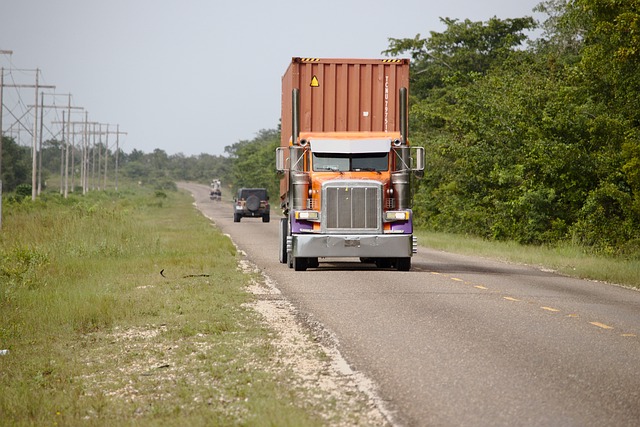VIN checks are essential tools for heavy-duty truck stakeholders to access critical data about a vehicle's history, specifications, and potential issues, enhancing safety, regulatory compliance, and operational efficiency. Proactive VIN checks could have prevented recent steering failures, underscoring the importance of detailed tracking and maintenance records in ensuring reliable and safe trucks within the industry.
In the ever-evolving landscape of heavy-duty transportation, maintaining unparalleled safety and reliability is paramount. Central to this effort is the meticulous execution of a Heavy-Duty Truck VIN (Vehicle Identification Number) Check—a process that offers a wealth of insights into a truck’s identity, specifications, and history. Recent events, such as widespread recalls due to critical steering failures, underscore the urgency of such checks. This article delves into the intricacies of VIN Checks, revealing why they are indispensable for stakeholders aiming to navigate regulatory compliance, mitigate risks, and extend the lifespan of their heavy-duty vehicles.
- Understanding VIN Checks in Heavy-Duty Trucks
- Recent Recalls Highlight VIN Importance
- What Information Does a VIN Check Uncover?
- Benefits of Proactive Vehicle Due Diligence
- Best Practices for Conducting VIN Checks
Understanding VIN Checks in Heavy-Duty Trucks

A Vehicle Identification Number (VIN) check is a critical process in heavy-duty transportation, acting as a comprehensive report card for each truck. It goes beyond simply identifying a vehicle; it unveils a wealth of information crucial for safety and maintenance. Through this check, stakeholders gain access to detailed specifications, including engine type, transmission details, and even historical service records. This knowledge allows them to anticipate potential problems, especially those related to heavy-duty components that undergo significant stress.
Recent events, like the widespread steering failure recall, highlight the importance of these checks. By examining a truck’s VIN, professionals can swiftly determine if a vehicle is part of such recalls, enabling prompt action to ensure road safety. Moreover, it helps maintain regulatory compliance and reduces the risk of legal issues related to unsafe vehicles.
Recent Recalls Highlight VIN Importance

Recent events have underscored the vital role of Vehicle Identification Number (VIN) checks in heavy-duty transportation. The recall of a significant number of heavy trucks due to steering failures has brought to light the importance of meticulous vehicle history tracking. When a defect is identified across multiple manufacturers and models, it becomes evident that a comprehensive VIN check could have revealed these issues earlier. This would have allowed for proactive measures to mitigate risks and ensure the safety of drivers and other road users.
These recalls serve as a stark reminder that vehicles’ detailed records are not just a regulatory requirement but a necessary step in maintaining operational efficiency and public safety. By conducting thorough VIN checks, fleet managers, owners, and stakeholders can stay ahead of potential problems, ensuring their heavy-duty trucks meet the highest standards of reliability and safety.
What Information Does a VIN Check Uncover?

A Vehicle Identification Number (VIN) check is a powerful tool that unveils a wealth of information about a heavy-duty truck. This unique identifier, consisting of 17 characters, acts as a digital fingerprint for each vehicle, providing insights into its identity and history. Through this process, stakeholders can gain access to detailed specifications, such as the make, model, year, and engine type. Moreover, it offers a glimpse into the manufacturing process, including the location and date of production, ensuring accountability and authenticity.
Beyond basic details, a VIN check reveals a vehicle’s service history, including any accidents, repairs, or maintenance records. This historical data is invaluable for identifying potential red flags, such as recurring issues or improper maintenance, which could impact the truck’s current condition and future performance. By uncovering this information, businesses can make informed decisions, conduct effective preventive maintenance, and ensure that their heavy-duty trucks meet the highest safety standards.
Benefits of Proactive Vehicle Due Diligence

In today’s digital era, proactive vehicle due diligence is no longer a best practice but an indispensable necessity in heavy-duty transportation. Beyond ensuring compliance with safety regulations, a meticulous Vehicle Identification Number (VIN) check offers numerous advantages. It enables stakeholders to uncover critical information about a truck’s past, including maintenance history, accident records, and previous ownership details. This knowledge empowers them to make informed decisions, predict potential issues, and implement necessary repairs or upgrades before serious problems arise.
Moreover, proactive checks contribute to the overall safety of our highways and roads. By identifying trucks with hidden defects or those that have not undergone proper maintenance, stakeholders can prevent accidents and protect lives. It’s a significant step towards fostering a culture of safety within the industry, where transparency and accountability are paramount.
Best Practices for Conducting VIN Checks

When conducting Heavy-Duty Truck VIN checks, adherence to best practices is paramount. Firstly, utilize reputable and up-to-date Vehicle Identification Number (VIN) databases that offer comprehensive information on various vehicle models, including heavy trucks. These databases often provide details such as manufacturing dates, specifications, and service records, allowing for a holistic understanding of the truck’s history.
Another crucial practice is to involve qualified personnel who are well-versed in reading and interpreting VINs. They should check for any discrepancies or unusual entries that could indicate tampering or hidden maintenance issues. Additionally, maintaining detailed records of each VIN check, including findings and actions taken, is essential for tracking potential problems over time and facilitating effective fleet management.
In conclusion, conducting meticulous Heavy-Duty Truck VIN Checks is not just a best practice; it’s an indispensable step in the modern transportation industry. By leveraging this process, stakeholders can proactively identify potential issues, ensure compliance with safety regulations, and ultimately extend the lifespan of their vehicles. In light of recent recalls, it’s clearer than ever that a thorough understanding of a truck’s history through VIN checks is a critical component in maintaining safe and reliable fleets.



